
Elaine, Simon Barber and me – Photo courtesy of foodbod.wordpress.com
Last Saturday, Elaine (from foodbod) and I were very fortunate to be at the BBC Good Food Show as guests of Barber’s Farmbouse Cheesemakers. We were met at the Press Desk by Duncan from their PR company who armed us with press passes (for which I was extremely grateful later, as with them, we had access to the calm of the Press Room, far, far from the madding crowd) and then Elaine and I immediately went off for a natter and a restorative green tea and a double espresso – I will leave you to guess who had what!
Following a call from Duncan (very The Apprentice!), we went off to meet Simon and Charlie Barber at the Barber’s stand, which was right next to thousands of cheeses laid out on tables for the World Cheese Awards.
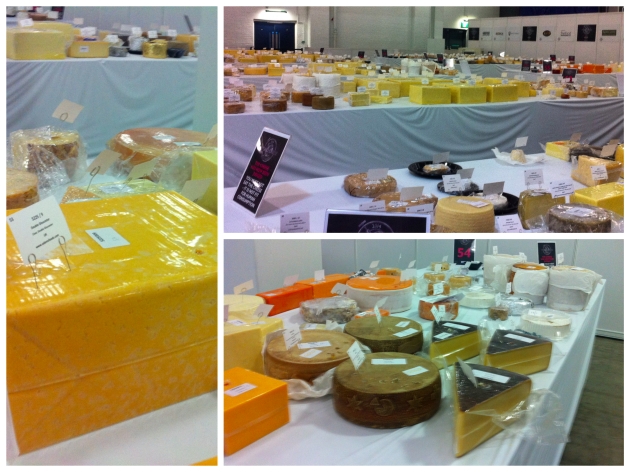
Some of the many tables groaning under the weight of over 2,000 cheeses at the World Cheese Awards
The WCA had over 2,000 entries from cheese makers all over the world and these had been judged on Friday. Barbers came away with 8 awards for their cheeses, including a Super Gold for their Vintage Farmhouse Cheddar, which was voted 3rd best, making it one of the top 50 in the world. During the judging, they were at Number 1 (Champion) for quite some time. Coming in 3rd overall with a haul of 2 golds, 4 silvers, 1 bronze and that fabulous Super Gold is pretty good going in a competition of over 2000 entries!
Very proud our vintage cheddar won Super Gold at the #WorldCheesAwards and was then voted 3rd best from over 2000 cheeses at #Goodfoodshow.
— Barber’s (@Barbers1833) November 17, 2014
Some facts about the Barber Family and their traditional cheese making process:
- The Barber Family has been farming and making cheddar at Maryland Farm in Didcheat, Somerset, since 1833, making them the oldest cheesemaker in England.
- Six generations of Barbers have sustained the family business.
- The Barber Family are the sole guardians of the original live starter culture which contains the friendly bacteria that start the cheese making process.
- This culture has been kept alive through the years, surviving two World Wars as well as the near disappearance of traditional cheddar cheese making which began with the arrival and popularity of freeze dried starter cultures. These are cheaper to use but cannot compare in to the complexity and depth of flavour achieved using a live culture.
‘Our starter culture is the signature of our cheese. We’re simply doing just as our ancestors did, only these days we have the technology to choose the blend of bacteria that we think makes our cheese taste the best. Our starters provide character and individuality. It’s what makes our cheddar taste so good, so more-ish. It gives it structure and flavour.
‘As a family we decided that traditional starter cultures needed to be protected – if they died out then proper West Country cheddar would too. So we set up a lab to keep the cultures safe and to this day the process continues. In essence, the culture starts everything off; we keep a little of the new milk and starter mixture back; which then becomes the starter for the next batch; and so it continues, every day, and hopefully for many more years, and generations of Barber’s to come. Nicholas Barber.
- In the 1950’s, the family invested in their own labs to preserve the rapidly diminishing starter cultures critical in making farmhouse cheddar and it is thanks to the Barber Family that we can still enjoy traditional farmhouse cheddar today.
- Barbers also supplies cultures for surrounding cheddar producers such as Wyke Farms and Montgomery’s.
- Barbers continue with many traditional cheesemaking methods such as turning cheddar curds by hand – cheddaring – in open vats.
- The cheddar is aged in special wooden boxes which maintain a firm, closed structure.
- The company has been given Protected Designation of Origin (PDO) status that protects and establishes their cheese as being made in its ancestral home using the traditional recipes and methods practiced since cheddar was first developed.
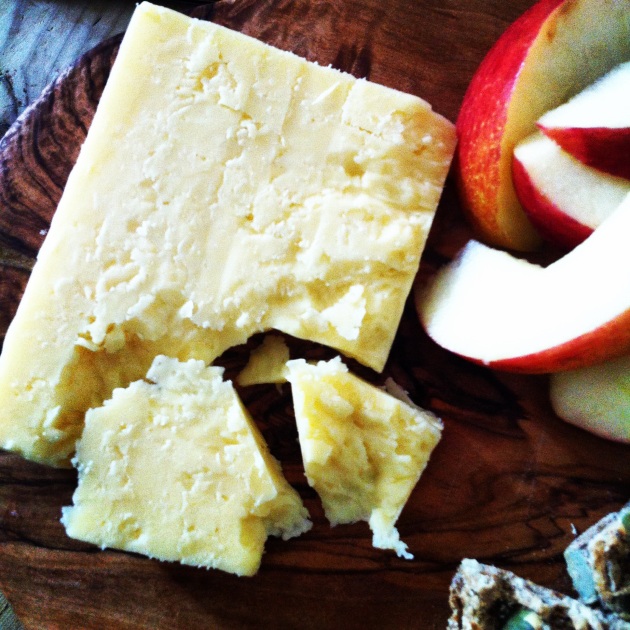
Barber’s 1833 Vintage Reserve Cheddar – creamy and slightly nutty – just so delicious!
- Barber’s 1833 Vintage Reserve Cheddar has a unique complexity that can only be found in cheddar made with a traditional starter culture.
- Barbers 1833 Vintage Cheddar is matured for 24 months and will only leave the farm when one of the Barber Family have tasted and approved it.
Our Vintage Reserve Cheddar 1833 is firm to the touch, has a consistent creamy colour throughout and a smooth texture interspersed with small, crunchy crystals. These are not made of salt, but calcium lactate and should be present in good quality aged cheddar of about 18 months or over. It’s a good indication that the cheese has been made well and is old enough to be full-flavoured and tasty. http://www.barbers1833.co.uk
- The copious by-product of the cheese making process, whey, is not wasted. From whey butter to vodka; concentrated powdered protein for food products to lactose for livestock feed; even the resulting water that is used to wash down the barns is then filtered again to the highest river water quality. Truly sustainable farming which is just so admirable.
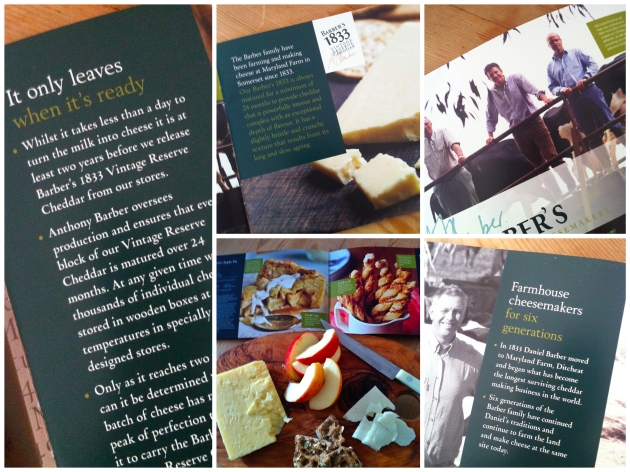
Did you know?
- Mature cheddar melts and blends better than other cheeses
- It takes 10 litres of milk to make 1 kg of Cheddar
- Cheddar cheese contains more protein and less sodium than most other cheeses
- Due to it’s minimal lactose content, Cheddar is suitable for those who are mildly lactose intolerant
- Cheddar originates from the village of Cheddar (a few miles away from Maryland Farm) in Somerset.
- Cheddar Gorge on the edge of the village contains a number of caves, which provided the ideal humidity and steady temperature for maturing the cheese.
- The name Cheddar comes from the Old English word ceodor, for deep dark cavity or pouch which references the caves that the cheese matured in
Cheddar has been produced since at least the 12th century. A pipe roll of King Henry II from 1170 records the purchase of 10,240 lb (4,640 kg) at a farthing per pound. Charles I (1600–1649) also bought cheese from the village…Wikipedia
Elaine and I reluctantly left, having listened to Simon and Charlie, who are so incredibly passionate about their cheese, tell us about their history and the cheese making process. We tasted all sorts of delicious cheeses made by the family including a lovely hard goat’s cheese and a smoked cheese made by their cousins in Wookey Hole.
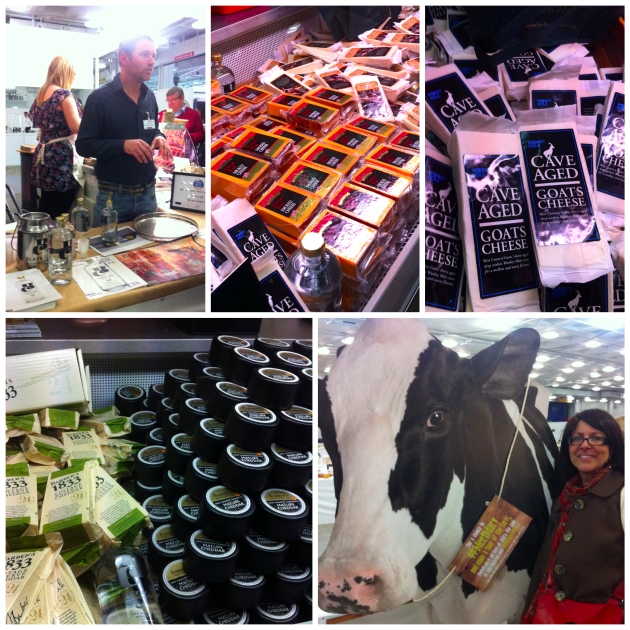
A selection of cheeses from Barbers and their cousins at Wookey Hole
I also had a shot of the Black Cow Vodka, despite the early hour and have to say that it was utterly smooth and very, very drinkable. Drinkable until the cows come home according to their very cool, animated video and I would not argue with that!
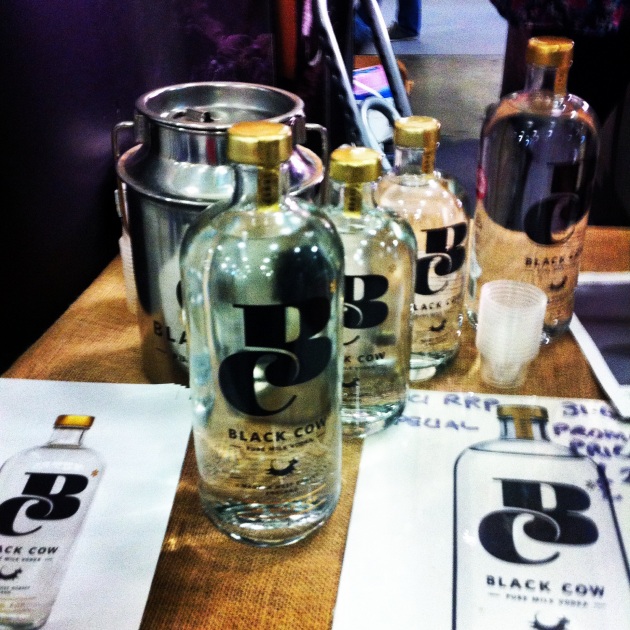
Super smooth Black Cow Vodka
We also came away with a very smart green Barber’s cool bag with a over a kilo of their Vintage Reserve Cheddar and a booklet full of recipes. I shall be posting the recipe I developed using my local produce and their cheese as challenged by Charlie Barber.
We are hoping to visit Maryland Farm in the spring and I can’t wait! Wellies at the ready, Somerset, here we come!
So now that I have whetted your appetite, you obviously want to know how to get your hands on this award winning, gorgeous cheddar cheese. Barber’s 1833 Vintage Reserve Cheddar is available from Fortnum & Mason, Waitrose, Sainsbury’s, delicatessens and farm shops nationwide and directly through barbers1833.co.uk in the UK. It is also available from Whole Foods in the States; Harris Farm Markets and independent retailers in Australia; Dean and Deluca in Dubai so google them to see if they are available in your country.
Full disclosure – Barbers supplied us with press passes and cheese to take home but the opinions expressed are entirely my own.
Sharing this with the hungry hordes over at Angie’s Fiesta Friday #43 which this week is being co-hosted for the second week running by Tracy @Scratch It and Stephanie @The Cozy Cook. Thank you ladies – it’s going to be a blast!
© Selma Jeevanjee and Selma’s Table, 2013, 2014. Unauthorised use and/or duplication of this material, including photographs without express and written permission from this blog’s author and/or owner is strictly prohibited. Excerpts and links may be used, provided that full and clear credit is given to Selma Jeevanjee and Selma’s Table with appropriate and specific direction to the original content.


Fabulous post honey, far more informative than mine!! Thank you for your fab company and a great day xxx
LikeLike
I loved all the photos in yours Elaine and you got yours out immediately rather than a week later like tardy me! I did do quite a lot of research into them and honestly I am astounded at how amazing, forward thinking, community minded, environmentally aware they are. What a fabulous family and to not have squandered any of it over 300 years and 6 generations is really something!
LikeLiked by 1 person
Amazing! A truly inspirational story :) just what you want it to be xx
LikeLike
Pingback: Thanksgiving Corn Pudding (Steamed) | Fiesta Friday #43 | The Novice Gardener
What a lovely day you two had!! So jealous of the WCA experience but thank you for sharing all the amazing facts with us!! :)
LikeLiked by 1 person
Pleasure Tracy – I know it was a bit of a read but they are such an amazing family producing really delicious cheese. Thank you so much for co-hosting again this week x
LikeLiked by 2 people
Wonderful history of this special cheese and the family who is preserving its heritage. It’s amazing that the smallest organism can produce such a complex flavor and account for such a difference between the heritage and freeze-dried culture produced cheeses. What a great opportunity for you and Elaine and so nice to see you two together!
LikeLike
Thanks Sue – we had a brilliant time. The event was great – lots of tasting but Barbers were just incredible to get to know. Do try and get your hands on some – it melts beautifully and would be delicious on your burgers!
LikeLike
First, how lovely that you got together with Elaine again. Very interesting/informative cheesecake story.
LikeLike
Fae, it was so lovely to see Elaine again – we do keep in touch but there is nothing like a natter over a cuppa! Barbers is a great story – truly inspirational on so many levels – I am so pleased that we got to meet them and try their cheeses.
LikeLiked by 1 person
Selma how cool is that, you two sound like you had an amazing and very interesting day. I love people that are passionate and love what they do and the good people at Barbers obviously do and it appears to show in their product. Great post.
LikeLike
Thanks Suzanne – we had a great time. The Barbers are such an inspiring family with a rich history. Their delicious cheese is stocked at Whole Foods in the States, so do look out for it – it is wonderful all melty in a grilled cheese or burger as well as is with a slice of apple!
LikeLike
Sounds like my kind of day out. Real cheddar is my favourite style of cheese, and nobody beats the English for doing it well, although that said, there are some fine Aussie examples too. I’ll look our for Barber’s! Great post Selma
LikeLike
Thanks Sandra! You do have some fabulous cheeses – how could you not?!! I’d love to know what you think of Barber’s if you do get to try some!
LikeLike
Awwww this was soooo great! And I love a cheese obsession so I really enjoyed living through your day!!!! ;) Perfect for Fiesta Friday, thanks so much for sharing!
LikeLike
Thanks so much, Stephanie and thanks for co-hosting xx
LikeLiked by 1 person
Thanks to you, Selma, I am now going to eat much more cheddar !!!! {grin}
LikeLike
Everything in moderation but if you are going to eat more cheese, it should be something gorgeous like Barber’s!
LikeLike
Sounds like you had a lot of fun! I mean who would not among all that cheese :)
LikeLike
That cheese room was an incredible sight to behold!! The event was good fun it was great to go with Elaine.
LikeLike
looks like you guys had lot of fun, awesome post… Happy FF
LikeLike
Thanks Chitra – it was a good day out with the lovely Elaine!
LikeLiked by 1 person
What a great time! I love cheese, and would have loved attending this event too.
LikeLike
I always look forward to this event but it was even better to share it with Elaine this year and learn all about Barber’s too!
LikeLiked by 1 person
Great cheese, nice people :)
LikeLike
Really nice people – they said nice things about you btw!!
LikeLike
Ah bless them, they are lovely. Sounds like you had a great day. I loved it when I went – spent far too much money!
LikeLike
Such nice people with a great working ethos too. So easy to spend, spend, spend…Within 5 minutes of getting to the show, I got sucked in to buying a couple of “amazing” food graters – 2 for the price of 1. Got home and excitedly tried it on the cheese – meh…no biggie!
LikeLike
Loved coming along your VIP tour Selma and learning so much about my favorite cheese! Did not know there was a town named Cheddar. By the way, I’ve had rave reviews from friends who have made your roast lamb:)))
LikeLike
Glad you enjoyed the tour! Yes, Cheddar is an actual village but what is really sad is that it is only home to one cheese maker now. So happy to hear that your friends have enjoyed my reipe for Sublime Lamb – it is such a great way to cook it. I have a recipe for stuffed springbok on the blog that I usually do with lamb – you might like it too. It’s stuffed with couscous and olives…
LikeLike
This looks and sounds like soooo much fun, Selma! :) I’m a teeny tiny bit jealous! :)
LikeLike
Tina, I wish you could have been there, you would have loved it – we should plan for next year…
LikeLike
That looks like an awesome ‘bloggers day out’ . Just the kind of outing I would love. And that’s a whole lot of info you brought back for us. And my my 😱 Never set my eyes on such a huge cow 🐐. Lucky you both could get hold of the prize winning cheese. Now can’t wait to check your awesome recipes 👍
LikeLike
Thanks so much!! The cow is called Mary, by the way!! Elaine and I had a great time and both loved the cheese!
LikeLiked by 1 person
Quite fascinating Selma, it makes me wonder how close what we eat as cheddar is to the real thing! Thanks for the tour :)
LikeLike
It’s all to do with the starter culture. I guess it comparable to bog standard, squishy factory bread full of additives vs artisan made bread using pure ingredients and live yeast starters. Interestingly, Tesco use Barber’s in some of their ready meals but don’t sell it!!
LikeLike
that vintage cheddar *swoon*
LikeLike
It is so good!!
LikeLike
Pingback: Tomato & Chard Crostata with Barber’s Cheddar | Selma's Table
Wonderful post, Selma. I am happy to see you and Elaine. ;)
LikeLike
Thanks Bubbles!
LikeLike
Pingback: Spicy “Po’ boy” Toastie | Selma's Table